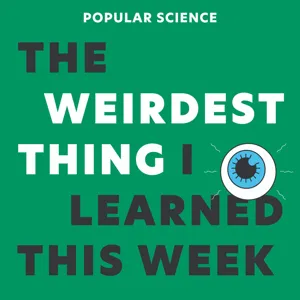Podcast Summary
Technology's Impact on Agriculture and Home Services: AI and CRISPR technology boost food production in agriculture, while Angie's platform simplifies hiring home professionals
Technology is revolutionizing various industries, from agriculture to home services, to make our lives easier and more productive. In the podcast "Tools and Weapons," Microsoft's Brad Smith discusses with Bayer CEO Bill Anderson how AI and CRISPR technology are being used in agriculture to increase food production without fertilizers. Meanwhile, Angie's innovative platform simplifies the process of hiring skilled professionals for home projects. At Popular Science, editors share their discoveries of the weirdest things they've learned, from a tooth caper to the potential for ancient archaeological discoveries. Annalie Newitz, a science journalist and science fiction author, joins the show to discuss her latest book, "Four Lost Cities," and her podcast, "Our Opinions Are Correct." Overall, these examples showcase the power of technology to solve real-world problems and satisfy our curiosity.
Challenging assumptions about prehistoric leaders: New scientific discoveries, like analyzing tooth enamel for sex determination, are revealing that prehistoric societies may not have been as male-dominated as once believed, challenging historical assumptions and emphasizing the importance of using scientific evidence to reevaluate the past.
Our understanding of prehistoric societies and their leaders is being reevaluated through scientific discoveries. Archaeologists used to assume that important leaders were male based on limited evidence, but recent studies, such as the analysis of the "ivory man" in Spain, have shown that this may not always be the case. The use of advanced techniques like analyzing tooth enamel for sex determination has led to the discovery that the "ivory man" was actually a woman. This challenges the prevailing narrative of prehistoric societies being male-dominated and highlights the importance of using scientific evidence to reevaluate historical assumptions. The study also emphasizes the need to reconsider our understanding of social complexity in prehistory. It's important to remember that sexing skeletons is not an exact science and that our assumptions about the past should be open to revision as new evidence emerges.
Challenging historical assumptions: New discoveries and analysis can challenge long-held beliefs about the past, leading to expanded knowledge and understanding.
Historical discoveries and understanding of the past are constantly evolving as new research and perspectives emerge. For instance, the assumption of a male skeleton being a king based on burial items in the 1960s at the Cahokia site in Southern Illinois was later found to be incorrect. New analysis revealed that the skeletons were actually those of a man and a woman who were likely part of a sacrificial ritual. This discovery challenges the long-held belief of a patriarchal society and sheds light on the potential matriarchal nature of the civilization. The importance of reexamining historical discoveries and challenging assumptions is crucial in expanding our knowledge and understanding of the past.
The Complexity and Ambiguity of Historical Interpretations: Our assumptions about ancient objects and their purposes can be influenced by biases and beliefs, and may never be fully known. Historical interpretations require ongoing questioning and reevaluation.
Our understanding of history and the intentions behind artifacts can be subjective and open to interpretation. During a podcast discussion, the speaker highlighted how assumptions about ancient objects, such as phallic sculptures, can be influenced by our biases and beliefs. She emphasized that we may never know the true purpose of these objects, and that they could have been used for various reasons, including religious, artistic, or even personal pleasure. This theme was further explored in the context of bog butter, where researchers are challenging the notion that there had to be one purpose for this ancient practice. The speaker also mentioned the use of artificial intelligence and CRISPR technology by Bayer to increase food production, and the importance of innovation in keeping companies relevant. Lastly, she introduced the concept of Angie, a platform that simplifies the process of hiring skilled professionals for home projects. Overall, the discussion underscored the complexity and ambiguity of historical interpretations and the importance of questioning our assumptions.
Birds Adapt to Urban Environments Using Harmful Materials: Birds can adapt to urban environments by using harmful materials like anti-bird spikes, barbed wire, screws, and nails for nesting. This behavior showcases their resilience and ingenuity.
Birds are resourceful creatures and can adapt to their environment, even using human-made structures intended to deter them for their own purposes. Researchers at the Natural History Museum in Rotterdam discovered that crows and magpies were using anti-bird spikes to build their nests. This behavior is not new, as birds have been seen using harmful materials like barbed wire, screws, and nails for nesting for decades. Even pigeons, known for their seemingly haphazard nests, have been found to use syringes to keep their eggs from rolling away. Birds' ability to adapt to urban environments and make the best of human-made structures is a fascinating example of nature's resilience. The researchers also noted that while anti-bird spikes can be harmful, they can also serve as a resource for birds, such as peregrine falcons, which use them as a place to store food. Overall, this discovery highlights the ingenuity of birds and their ability to thrive in unexpected places.
Birds use human-made objects for nesting: Birds like magpies and crows use human trash for insulation, structural support, and display purposes. Over 170 bird species have been found to incorporate human-made materials into their nests.
Birds, particularly magpies and crows, have been found to use human-made objects, such as spikes and trash, for building their nests. While it's concerning that birds are using our trash, some materials can actually be beneficial for insulation or structural support. Research suggests that larger birds with sexual dimorphism and those building complex nests are more likely to use human-made materials for display purposes. Another paper found that 176 bird species across continents have used human trash in their nests, highlighting the need for less litter and single-use items. Interestingly, hostile architecture designed to keep people from settling in certain spaces shares a parallel with birds' use of human-made objects for nesting. Birds, like magpies and crows, demonstrate resourcefulness and adaptability in using human-made objects for their needs, much like how humans repurpose items for various uses. This discovery offers a fascinating insight into the interconnectedness of human and animal worlds.
Considering alternative solutions for urban wildlife issues: Instead of eliminating birds from urban areas, focus on alternative solutions like covering cars or communicating with them for a more harmonious coexistence.
Instead of focusing on removing organisms, such as birds, from urban spaces due to perceived issues like poop or noise, we should consider alternative solutions like covering cars or communicating with the birds. This approach is more effective in addressing the root causes of the problems and can lead to a more harmonious coexistence between humans and wildlife. Another interesting topic discussed was the Bronze Age collapse around 1200 BCE, where some civilizations were collapsing while others were rising. This period of transition saw people rejecting those in control and evidence of battles and natural disasters. However, many archaeologists argue against the use of the term "collapse," as it doesn't fully capture the complexity of the situation. Instead, they focus on the rise of new civilizations and the ongoing changes during this time.
Sudden emergence of thriving community during Bronze Age collapse: A previously underoccupied area saw a surge in population and prosperity during the Bronze Age collapse, with evidence of advanced pottery production, long-distance trade, and importation of valuable resources.
During the Bronze Age collapse around 1200, a previously underoccupied area in Porto Rafti, Greece, saw the sudden emergence of a thriving community. Archaeologists discovered a fancy cemetery with grave goods typical of the palatial period. Through noninvasive surveys, they found evidence of a large pottery production facility making popular whiteware, as well as a variety of cookware and tools. This community not only survived the collapse but thrived, engaging in long-distance trade and importing materials like obsidian. Their access to resources and entrepreneurial spirit allowed them to maintain a comfortable lifestyle and stay connected to trade networks.
Surviving the Post-Bronze Age: Strong Connections and Global Perspective: In times of chaos and uncertainty, forging strong local connections and embracing a global perspective can lead to survival and thriving communities.
During the post-Bronze Age period, communities that survived were those with strong local connections and interdependence, as well as access to seafaring trade. The presence of immigrants and a multicultural community may have also played a role in their survival. This is evident in a village discovered in Greece, which showed evidence of trade with distant places like Cyprus and interactions with groups like the Phoenicians. Despite the challenges and collapsing cities during this time, the village thrived for at least 150 years by utilizing their skills, trading, and connections. This story serves as a reminder that even in times of chaos and uncertainty, survival is possible through forging connections and embracing a global perspective.
Adapting and Thriving in Adversity: Ancient people showed resilience and creativity by focusing on making pottery and providing tasty food after the collapse of their city. Modern individuals can learn from their example and find ways to adapt and thrive in challenging times.
Even in the face of adversity, people have the ability to adapt and find ways to create and thrive. The discussion revolved around the story of ancient people who, instead of becoming cannibals or hunters after the collapse of their city, chose to focus on making pottery and providing tasty food. This shows their resilience and creativity. The speakers also shared their own plans for the future, such as making pottery or joining archaeological expeditions, emphasizing the importance of having useful and beautiful things. The theme of subverting expectations was prevalent throughout the conversation. Annalie Newitz, the guest, encouraged listeners to check out her latest book, "The Terraformers," and her podcast, "Our Opinions Are Correct," which can be found on her website, annalienewitz.com. The episode was produced by all the hosts, including Rachel Feldman, Jess Bodie, Billy Cadden, and Katie Beloff. The hosts also mentioned Angie, a platform that simplifies the process of hiring skilled professionals for home projects. Angie's expertise and new tools make it easier for homeowners to maintain their homes and complete projects.






